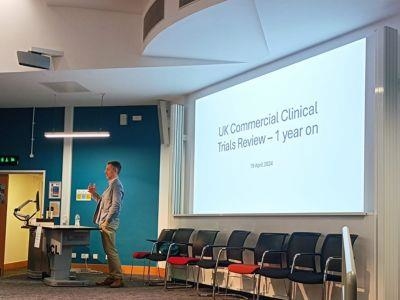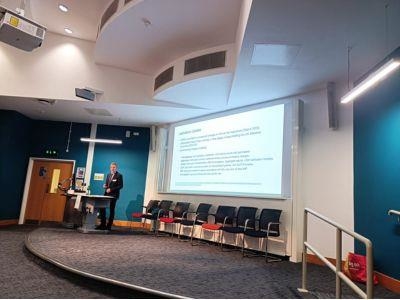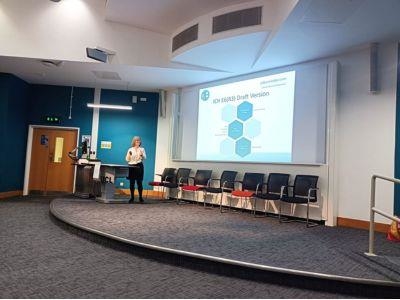Reflections from the ICR GCP and Ethics Forum April 2024
- 22 May 2024
- 11 min read
Kirsty Rogers, CRN Wessex Education and Training Manager recently attended the Institute for Clinical Research GCP and Ethics Forum in London. Here she shares her thoughts on the day.
In April 2024, I attended the ICR GCP & Ethics Forum- it was jam-packed with information on changes coming up in clinical research and this article aims to cover my key takeaways from the sessions to share with the community.
Lord James O'Shaughnessy
First up in the day was Lord James O’Shaughnessy reflecting on progress made in the year following his independent review of commercial clinical trials in the UK. The session was balanced, with evidence of changes that have been happening as a result of the review whilst recognising that there is still a way to go. Lord O'Shaughnessy was keen to hear from community members about the challenges and issues that they are still facing. He engaged thoroughly and with delicacy on attendees' thoughts.

Summary
Lord O'Shaughnessy highlighted 8 of the urgent challenges from the report, noting that a year ago the UK was second slowest country in the world to carry out Clinical Trials (CT) and how there had been a collapse in commercial CT by 50% meaning there was a 60% decrease in recruitment.
It was interesting to learn how other countries had approached solving issues relating to CT set up; such as Spain who had a Royal Decree to speed up approval and set up times and Australia who had introduced R&D tax credits for SMEs. It provided clarity on why the UK might not be as attractive for the global market due to CT set up times when countries, such as Poland, can recruit 3 times faster.
Essentially, as research professionals we want to provide better care for our patients. It was noted that if we maintained the numbers being recruited in 17/18, 125,000 patients would have had access to new drugs. Not only that there would have been an additional £570m income into the economy resulting in £360m savings! As stated by the NIHR, research really is for the health and the wealth of the nation.
Lord O'Shaughnessy noted that whilst COVID-19 was catastrophic, it demonstrated what the UK can do in terms of research delivery. He noted how Primary Care is negligible in CT activity and the UK is unique with the NHS setting being able to provide opportunities for the population at scale. However, it was recognised that we need to help the public engage differently (participant demand rather than the other way around) to quadruple commercial CTs by 2027.
Changes since the report
Whilst it was noted that recruitment for commercial studies from a baseline of 3,200 had increased by March 24 to 10,974, there was a long way to go.
In addition to that, regulatory assessments by the MHRA are being turned around within required timelines.
What is next?
Lord O’Shaughnessy was keen to state that protected time for research was not covered in the report due to NHS pressures but this would be something that would help increase research delivery.
There was a recommended focus on Primary Care to work on decentralised CTs to take advantage of their key role in NHS care.
Finally, it was discussed that attention is needed on later phase studies as the low price of drugs in the UK has an effect on the market and as there is a wealth of data within the NHS infrastructure, this would allow growth in this area.
Andy Fisher, MHRA
Next was an update from Andy Fisher, from the MHRA. His presentation began with providing an update on the amount of studies which have taken place since the Medicines for Human Use Regulations (2004) were introduced - 1,700 inspections!

There has been a change in the way inspections take place as a result of COVID with a third of inspections now either remote or taking a hybrid approach as a result of a smaller inspection team and an increase in the complexity of studies.
Trends in recent MHRA inspections
- Reference Safety Information (RSI) - Specific inspections relating to RSI have had to take place as there have been cases where the RSI being referenced for safety reporting (PV) is not the same as the submitted approved RSI.
My advice - If RSI is updated, this must be submitted and approved prior to use and ensure this is documented appropriately when disseminated to participating sites.
- Change control process unclear - Evidence has been lacking within the documentation audit trails as to when protocols are updated and when the change is implemented at sites (including lack of PI approval).
My advice - If a protocol amendment is approved, ensure that there is appropriate documentation noting when this was implemented within the TMF/ISF.
- Informed Consent - Due to changes in delivery of studies during the pandemic, there were a number of cases where patients were not appropriately consented.
My advice - If remote or online consent is used, consider how this can be documented appropriately - check out the NIHR Learn eLearning on Remote Consent for more guidance Course: Remote Consent | NIHR Learn.
- Patient Confidentiality - Again, as a result of changes in delivery, there has been a case on a decentralised trial of a CRO collecting Patient Identifiable Data (PID).
My advice - Consider completing a Data Protection Impact Assessment (DPIA) prior to your study opening, to consider what and when data is collected to ensure only those who are authorised to have access to PID are documented and clearly stated.
- Lack of PI Oversight - There have been cases where there is no documentation to demonstrate clear oversight of eligibility and decision making. The cases highlighted related to where labs are required but have not been reviewed by a PI prior to eligibility sign off and in the case of portables collecting safety notifications not having been looked at (evident from audit trail).
My advice - Map out the patient pathway and eligibility requirements prior to study start up to identify and plan best time for PI eligibility review. For studies using devices for safety monitoring, plan appropriate timepoints (based on participant risk) prior to the study and diarise to ensure regular oversight.
- Inadequate Risk Assessment - Cases of failure to demonstrate clear risk assessments but primarily this has been related to the lack of review of risk assessments following changes to the study (i.e. point of amendment, study extension etc.)
My advice - A risk assessment is not a one-off review at the beginning of the study and should be revisited every time there are changes in the study delivery - build these reviews into your C&C checks to ensure risk is appropriately managed.
Summary on the upcoming Medicines for Human Use Regulations update
Emphasis was given on a proportionate approach and changes such as aggregated pharmacovigilance (PV) reporting rather than individual to RECs and regulatory bodies. In addition, considering risk assessments specific to each individual study based on study endpoints not overall standard risks. It was noted that GCP would be the reference rather than the EU directive and we are likely to see a relaxed view on who can be a Principal Investigator, if it is proportionate to risk. The new statutory instrument is due to be presented to parliament in the next couple of months.
Summary on ICH E6 Revision 3 progress
Work is happening at pace with 2 meetings per week with an aim to complete guidance in Autumn 2024 ready for adoption (12 months after to implement).
Check out this useful blog from Andy Fisher on the upcoming changes ICH E6 (R3) Good Clinical Practice – MHRA Inspectorate (blog.gov.uk)
General guidance
Andy Fisher provided some examples of considerations which need to be given more care and attention as we move to fully computerised approaches. Some key points are as follows:
- Ensuring you remove access for leavers from all systems when their employment contract ends.
- Checking activation of unblinding process - if a PI has not 'activated' an account then access is needed in an emergency, unblinding cannot take place.
- Recommendation of adding in checks for doses per protocol into User Acceptance Testing (UAT) and validation on eCRFs - UATs should not just be looking at the functionality of the system.
- Ensuring appropriate access available for Electronic Health Records (EHR) with read only access and availability for tailored training for monitors/inspectors based on access needs.
- Consideration for naming conventions including dates for eTMFs and thought as to whether both an ISF and TMF is needed if it is a single site study.
- Ensuring audit trails are GCP compliant i.e. providing a clear reason for change within the records.
During the session, I asked whether there were plans to produce a new Grey Guide when ICH E6 Revision 3 is released but was advised there is no immediate plan to do so.
Jen Harrison, HRA
Jen Harrison from the HRA was next up, providing an update on the upcoming contractual agreements both for non-commercial and commercial studies.
Summary of contracts
Non-commercial
- New non-commercial Hub and Spoke Agreement to sit alongside the non-commercial CT Agreement.
- Update to non-commercial Organisation Information Documents
- Call for comment (until June 2024) for new non-commercial Model Investigator Initiated Study Agreement
Commercial
- New commercial finance appendix
- New commercial Master Confidentiality Disclosure Agreement ( instead of individual study CDAs)
- Updated model CDA
Up and coming contracts
- Commercial CI agreement
- Commercial ATIMP model CTA
- Commercial and non-commercial Data Access Agreements for Secure Data Environments (SDEs)
Other updates
Highlights were made to the various newsletters issued from the HRA to keep you in the know and you can find these HRA Latest - Health Research Authority.
Whilst it is not a legal requirement, the HRA encourages that all new research study applications include an Inclusion & Diversity Plan which forms part of their work with the MHRA to ensure people underserved by research are not overlooked. This will be a vital element used by Research Ethics Committees (RECs) in their review of new studies.
Confidentiality Advisory Groups (CAGs) are now all held on Zoom similar to standard REC meetings and researchers are encouraged to attend when their studies are being reviewed for approval.
Carolyn Maloney, R&D Forum
Carolyn Maloney was next to engage us on behalf of the R&D Forum. This was the first time the Forum had provided an update at an ICR GCP & Ethics Forum and as the event was attended by a wide range of research professionals, it was fantastic for NHS R&D to provide insight to those in industry about the reality and challenges of working in research within the NHS.
Summary
An overview of the various working groups, hosted by the R & D Forum but with membership from national experts working in R&D, was provided. There has been the formation of a number of new groups, such as a sustainability working group, created on the back of R&D community requests. More information on the working groups can be found here Groups & Current Work - NHS R&D Forum (rdforum.nhs.uk).
Carolyn detailed some of the challenges faced in the delivery of NHS research and provided recommendations of how this could be improved.
Recommendations included:
- Formulating a clear communication plan prior to a study - During Site Initiation Visits (SIVs), plan who the contacts are to ensure a streamlined approach.
- Sponsor FAQs on websites - If queries can't be answered from a protocol, consider creating a FAQ document or adding to a website as this will help speed up the feasibility process for NHS sites.
- Consider the delivery process - Investigate local processes before carrying out feasibility to reduce delays.
Heidi Chandler and Steve Burmester, Research Ethics Committee members
Next Heidi Chandler and Steve Burmester, Research Ethics Committee (RECs) members provided insight of their top tips for application.
Summary
There was a reminder that REC boards now all take place online and that RECs over the country have different specialities and areas of expertise, with advice that researchers should identify the most suitable REC for a study rather than just proximity to study sponsor.
The session focussed on specific areas to consider when completing applications. Key areas to note included:
|
Scientific validity |
Is the research question important and necessary? What level of Patient and Public Involvement (PPI) has taken place in the study design? How will the statistical analysis ensure the research question can be answered? Is there equipoise? |
|
Recruitment |
What is the inclusion and exclusion criteria and is it ethical? Have PPI been involved in the recruitment approach? How is diversity considered? What are plans for ongoing care post study? How will payments be made and is this fair? |
|
Risk vs Benefit |
What is the risk to individuals and impact to society? Is this proportionate to the individuals involved? Safeguarding for individuals involved - is anything included? Information should not be buried in Patient Information Sheets (PIS). Anecdotally, Heidi and Steve discussed they had received PIS which were 28 pages long and as a community, we should be creative in how information is provided for studies with other methods such as video, audio and diagrams. |
|
Valid Informed Consent |
An integral part of the Informed Consent review is the consideration of use of language, ensuring this is not coercive in any way i.e. not adding 'you have been chosen' instead of 'you are being asked' so it remains a choice for a participant Attention is given to the consideration of who approaches a participant for the first time, including when this happens and time given for consideration. Applications must state clearly the study procedures to demonstrate the burden to the participant to allow the REC review to consider if it is ethical. |
If you would like to find out more about how RECs review applications, it is worth considering applying to observe a meeting to find out a bit more about the process Observing a Research Ethics Committee meeting - Health Research Authority (hra.nhs.uk).
Jo Burmester, Clinical Research Knowhow
Final talk of the day was Jo Burmester providing a summary of changes in GCP-related regulations. Complementing the session from the MHRA earlier in the day, the session provided additional clarity on the upcoming changes.

Summary
Insights were provided on the link of ICH E8 R1 (E8-R1_Guideline_Step4_2021_1006.pdf ( (.PDF)ich.org) (.PDF)) Quality by Design being used to complement the upcoming structural changes to ICH E6 in Revision 3 and how the community should consider the quality management for individual trials rather than a cover-all approach, echoing the MHRA session to consider the critical parts of a particular study based on study endpoints.
The session navigated through the upcoming proposed changes to ICH E6 (R3):
- ICH E6 will have a new structure with a change to responsibilities of RECs and PI/Sponsor
- There will be the introduction of data governance responsibilities for PI/Sponsor
- A change for flexible approaches, based on adapting to risk and individuality of studies
- Encouragement to apply risk-based quality management (RBQM) and Quality by Design (QbD) throughout the research study lifecycle.
- Requirement to ensure all stakeholders (participants, vendors, sponsors, research sites) are included throughout to allow for decentralised clinical trials approach.
Of particular interest, there will be a move from the term ‘Essential Documents’ to ‘Essential Records’; this will now expand to include the TMF, EDC and eConsent. The change will allow for a pragmatic approach with 'Essential Records' being specified by study rather than a standardised approach for all.


